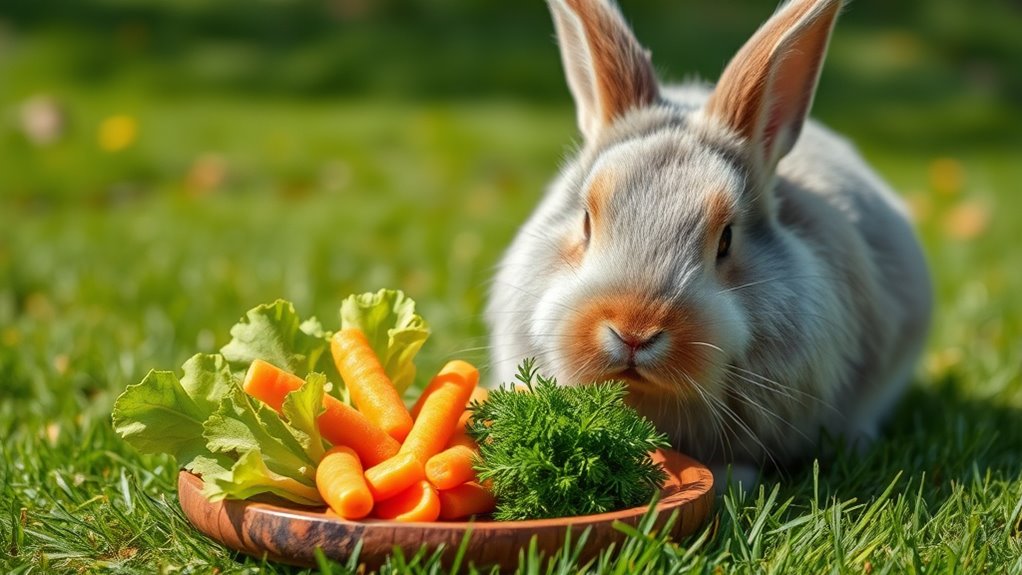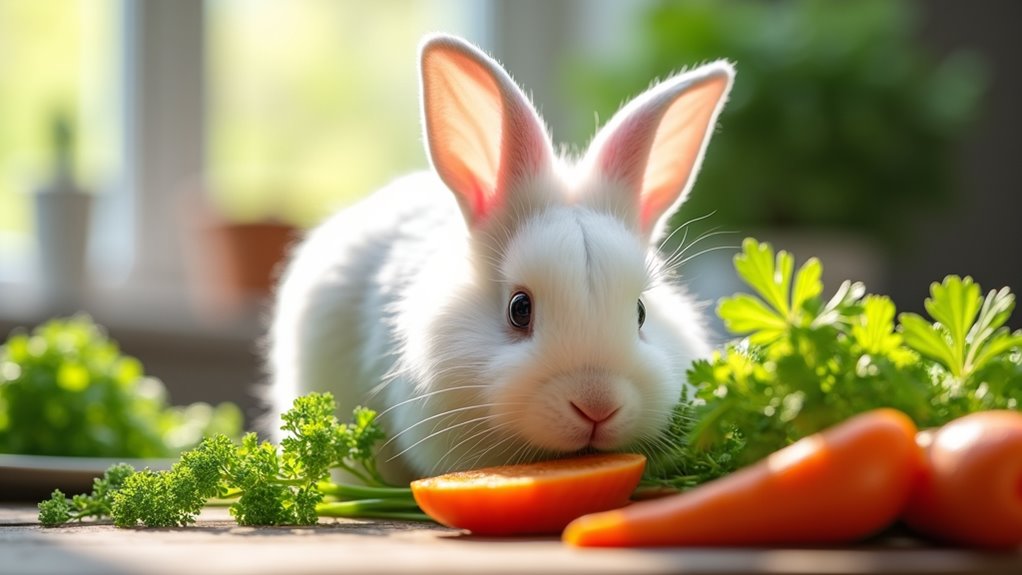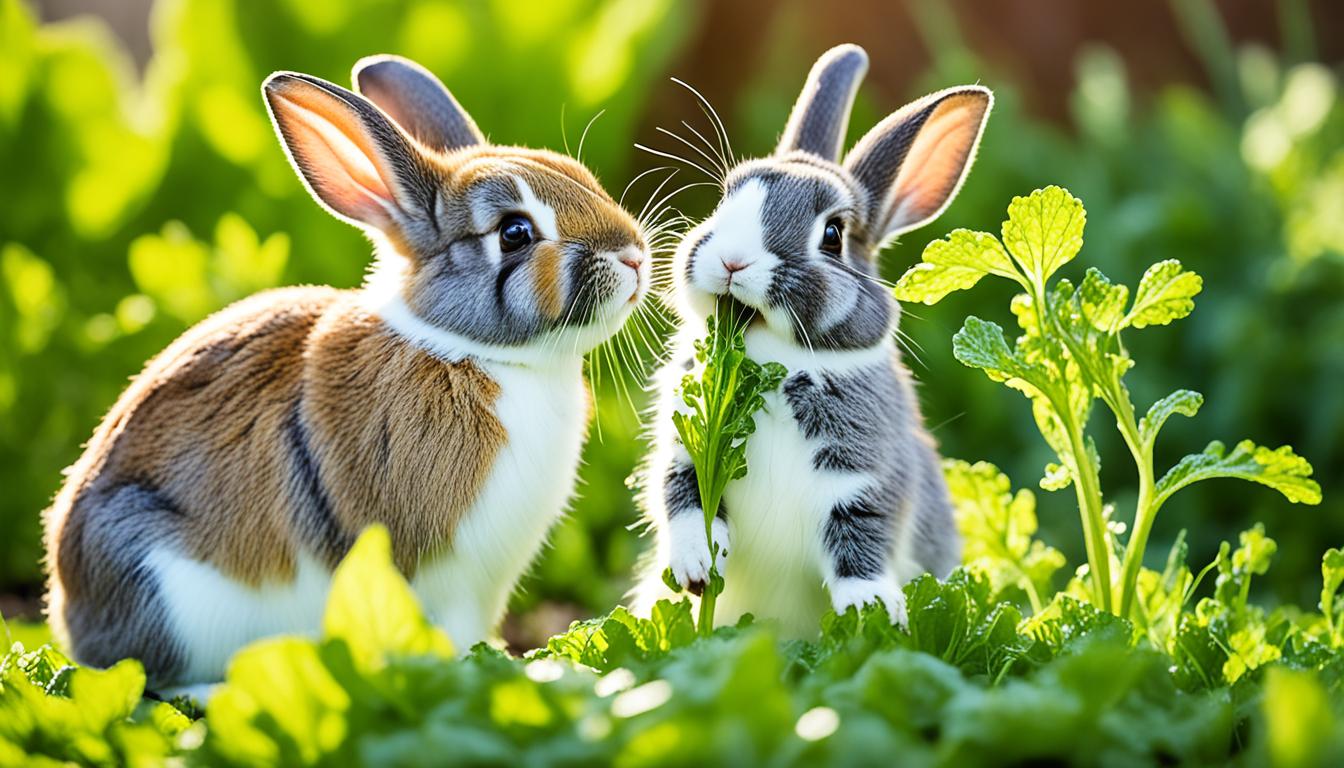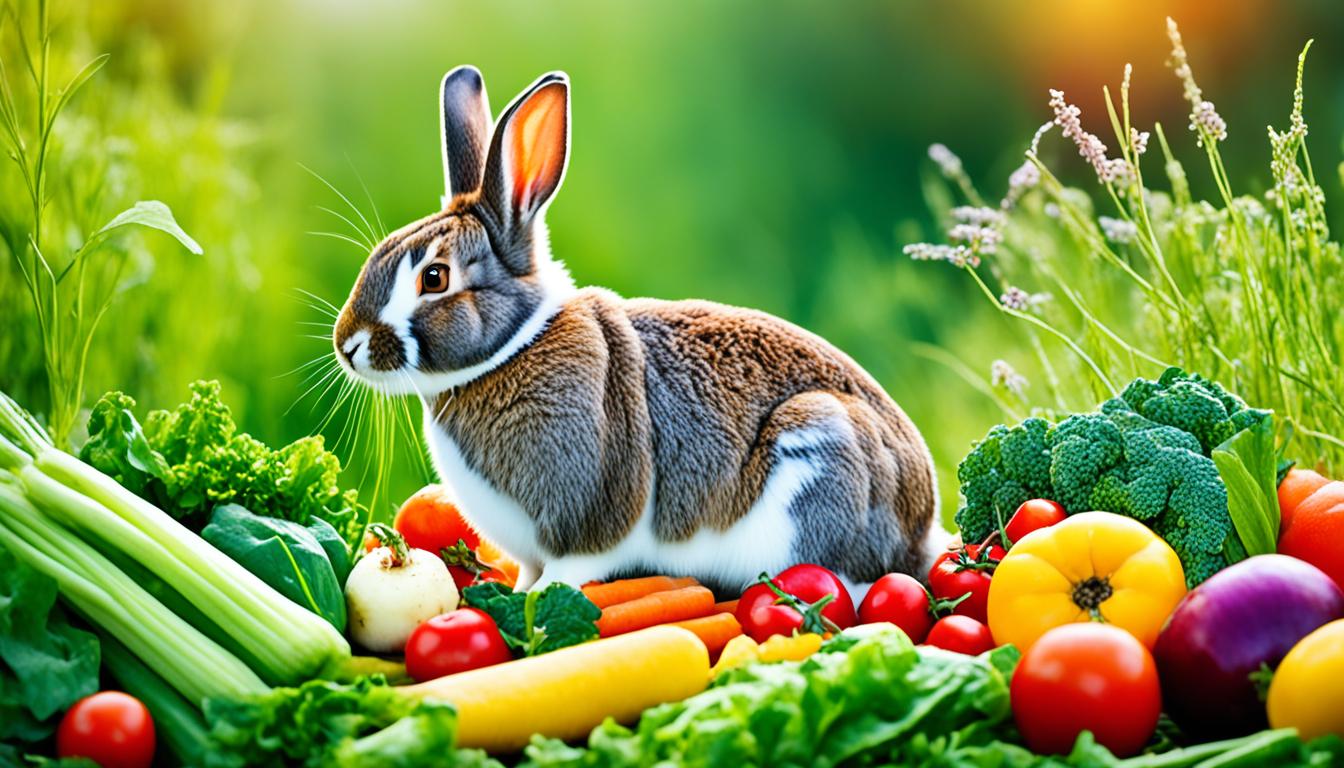To keep your bunny healthy, feed them mostly high-quality hay like Timothy, which helps with digestion and keeps their teeth worn down. Offer fresh vegetables such as leafy greens in moderation, and choose pellets high in fiber without artificial additives. Always guarantee access to clean water. Avoid sugary treats and processed foods that can upset their stomach. If you want to learn more about creating the perfect diet for your rabbit, keep exploring guidelines tailored for their needs.
Key Takeaways
- Provide high-quality hay, such as Timothy hay, as the main component of your rabbit’s diet for fiber and dental health.
- Offer fresh leafy greens like romaine lettuce, cilantro, and parsley gradually to supply essential nutrients.
- Feed high-fiber pellets in moderation, avoiding artificial additives and sugary treats to prevent obesity.
- Always ensure access to fresh, clean water to support hydration and digestion.
- Avoid giving rabbits sugary, processed, or low-fiber foods that can cause digestive issues or health problems.

Are you unsure about how to properly feed your rabbit? Providing a balanced diet is essential to keep your bunny happy and healthy. But it’s not just about what you feed them; understanding grooming tips and recognizing common health issues play a significant role in their overall well-being. Proper feeding helps prevent many health problems, such as dental disease, gastrointestinal stasis, and obesity, which are prevalent among rabbits when their diet isn’t right.
First, focus on offering high-quality hay, which should make up the majority of your rabbit’s diet. Timothy hay is a popular choice for adult rabbits because it’s rich in fiber, which aids digestion and keeps their teeth worn down naturally. Avoid giving your rabbit sugary treats or processed foods, as these can disrupt their digestive system and lead to weight gain. Fresh vegetables are also essential; leafy greens like romaine lettuce, cilantro, and parsley provide essential nutrients and fiber. Introduce new vegetables gradually to monitor any digestive reactions and avoid diarrhea.
Feed your rabbit high-quality hay like Timothy for fiber and dental health.
Pellets can be part of your rabbit’s diet but should be offered in moderation. Choose pellets that are high in fiber and free from artificial additives or sugars. Remember, overfeeding pellets can contribute to obesity and other health issues, so use them as a supplement rather than the main food source. Fresh water must always be available, ideally provided in a clean bowl or bottle, as hydration is critical for their digestive health.
In addition to feeding, grooming tips are fundamental to prevent common health issues. Regularly check your rabbit’s teeth, ears, and coat, and brush their fur to reduce hairball formation, especially during shedding seasons. Maintaining a clean living environment reduces the risk of infections. Also, keep an eye out for signs of illness, such as changes in appetite, droppings, or behavior, and consult a veterinarian if anything seems abnormal. Being aware of unhealthy feeding practices can help you avoid common pitfalls and promote your rabbit’s longevity.
Understanding what your rabbit needs for a balanced diet and how to care for them helps you prevent many common health issues. Proper nutrition supports their dental health, digestion, and overall vitality. Remember, a healthy diet combined with regular grooming and check-ups ensures your rabbit remains happy and active for years to come. Taking the time to learn about their dietary needs and grooming routines shows your commitment to providing the best care possible for your furry friend.
Frequently Asked Questions
Can Rabbits Eat Human Snacks or Processed Foods?
You shouldn’t give your rabbit human snacks or processed foods. Human snack hazards include high sugar, salt, and fat, which can cause digestive issues or obesity in rabbits. Processed food risks are also significant, as they often contain additives and preservatives that are harmful to rabbits’ sensitive systems. Instead, focus on a diet of fresh hay, vegetables, and rabbit-safe treats to keep your bunny healthy and happy.
How Often Should I Change My Rabbit’S Diet?
Think of your rabbit’s diet as a delicate melody—consistent and harmonious. You should change your bunny’s diet gradually, maintaining dietary consistency and nutritional balance, to prevent upset stomachs. Make small adjustments over a week, avoiding sudden shifts. Regularly monitor your rabbit’s health and adjust as needed, ensuring their diet stays stable and balanced. This approach keeps your bunny happy, healthy, and thriving in a well-tuned routine.
Are There Any Foods That Are Toxic to Rabbits?
You should know that some foods are toxic to rabbits, so always be cautious. Avoid toxic plant identification to keep your bunny safe, and stick to rabbit safe herbs like parsley, basil, and cilantro. Never feed them plants or greens you’re unsure about, as certain common garden plants can be harmful. Regularly check for signs of poisoning and consult a vet if you suspect your rabbit has ingested something toxic.
What Treats Are Safe for Rabbits in Moderation?
Imagine a garden bursting with color—your rabbit’s favorite safe treats await. You can offer fresh vegetable options like carrots, kale, or bell peppers, which are healthy in moderation. Safe fruit treats such as apple slices, strawberries, or blueberries add sweetness without harm. Always remember to introduce new treats gradually, ensuring they’re free of pesticides and seeds, so your bunny enjoys these delights safely and happily.
How Can I Tell if My Rabbit’S Diet Is Unbalanced?
You can tell if your rabbit’s diet is unbalanced by observing its behavior and health. If it shows signs of dull fur, weight changes, or digestive issues, it might lack proper rabbit nutrition. An unbalanced diet often lacks fiber or excess treats. Make certain your rabbit has a good dietary balance with plenty of hay, fresh vegetables, and limited treats, which helps maintain its overall health and well-being.
Conclusion
In nurturing your bunny’s well-being, you’re gently guiding them toward a balanced diet that nurtures their natural vitality. By thoughtfully selecting their foods and paying attention to their needs, you create a harmonious environment where they can thrive. Remember, your care and attention serve as the subtle threads weaving a healthy, happy life for your furry companion. With patience and love, you’ll ensure they flourish in a domain of gentle nourishment and tender companionship.









